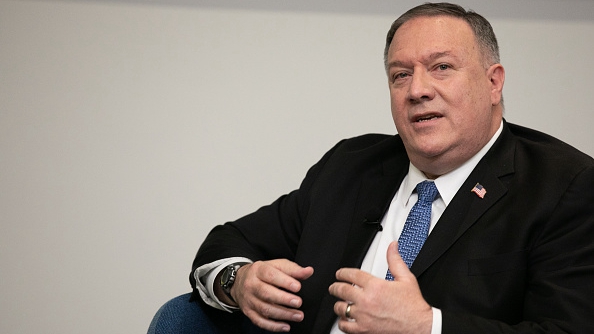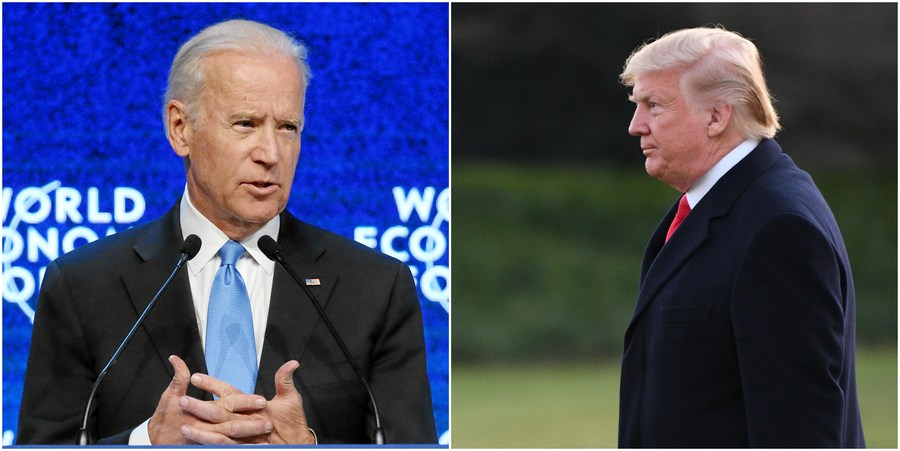
Former U.S. Secretary of State Mike Pompeo talking to press at Georgia Tech in Atlanta, Georgia, December 9, 2020. /Getty
Former U.S. Secretary of State Mike Pompeo talking to press at Georgia Tech in Atlanta, Georgia, December 9, 2020. /Getty
Editor's note: Andrew Korybko is a Moscow-based American political analyst. The article reflects the author's views and not necessarily those of CGTN.
China sanctioned 28 members of the former Trump administration on Wednesday who "planned, promoted and executed a series of crazy moves which have gravely interfered in China's internal affairs, undermined China's interests, offended the Chinese people, and seriously disrupted China-U.S. relations." This was a reasonable decision timed with their leader's departure from office and intended to be mostly symbolic since those officials no longer play any official role in bilateral relations. It shows the high level of self-respect that China has that it won't permit them to set foot on its soil or conduct business with the country.
Regrettably, however, the National Security Council spokeswoman of newly-inaugurated President Biden didn't see it that way. Emily Horne told Reuters that "Imposing these sanctions on Inauguration Day is seemingly an attempt to play to partisan divides. Americans of both parties should criticize this unproductive and cynical move. President Biden looks forward to working with leaders in both parties to position America to out-compete China." She's wrong about China's intentions, but it's unclear whether it's just an innocent misunderstanding due to her team's limited communication with China or if she's being dishonest.
About the second-mentioned possible explanation for her harsh statement, Horne might actually be the one playing partisanship here if she's attempting to bash China in order to earn Republican support for the Biden administration's forthcoming policy towards China, whatever it might end up being. After all, the Trump administration is already out of power and shouldn't officially have any influence on the new administration's policy formulation. This should make China's move more symbolic than substantive from the Biden administration's perspective. They could have therefore just ignored it and closed the chapter on that dark era.

Combo photo shows sitting U.S. President Joe Biden (L) and former President Donald Trump. /Xinhua
Combo photo shows sitting U.S. President Joe Biden (L) and former President Donald Trump. /Xinhua
Instead, Horne sought to make a "friendly" pass towards her Republican colleagues for what seem to be public relations purposes. She knows that some of them bitterly detest President Biden's election, including those unelected officials employed in the country's massive permanent military, intelligence, and diplomatic bureaucracies ("deep state"). It might very well be the case that she didn't want to leave what they might regard as an "insult" unanswered in the hopes that they won't consider the Biden administration to be "soft on China", or worse, perhaps silently approving of China's sanctions against Trump-era officials.
In any case, it was wrong for her to speculate about China's intentions when Beijing was crystal clear about why it imposed those sanctions. It had nothing to do with partisanship but everything to do with national self-respect. Unlike the U.S., China doesn't meddle in the domestic political affairs of other countries, though the Biden administration seems to be getting off on the wrong foot by projecting what might be its own intentions towards China. It should importantly be noted that Hsiao Bi-khim, the individual regarded by some anti-China hawks as Taiwan's unofficial so-called "ambassador to America", attended President Biden's inauguration.
Commenting on this provocative move, Horne was quoted by Reuters as saying that U.S.-Taiwanese ties are "rock-solid", adding that "President Biden will stand with friends and allies to advance our shared prosperity, security, and values in the Asia-Pacific region - and that includes Taiwan." From this statement as well as the one regarding China's mostly symbolic sanctioning of Trump-era officials, it looks like the Biden administration doesn't really have any intention of changing the policy of hostility against China that it inherited. If anything, it seems like they just want to make it more bipartisan by having the Democrats lead it instead.
It's still too early to confidently make that conclusion, however, which is why the aforementioned insight should only be considered as educated conjecture influenced by the new administration's first two statements of pertinence about China. Nevertheless, they still raise concerns about the direction that the Biden administration might be headed and whether it's even serious about truly reversing Trump's anti-Chinese policies. It can only be hoped that Horne's statements were shortsighted partisan opportunism for public relations purposes than a hint of an unproductive and cynical strategy that might soon be unveiled.
(If you want to contribute and have specific expertise, please contact us at opinions@cgtn.com.)

